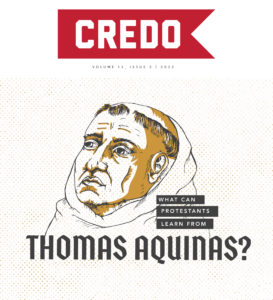
Why Protestants have always stood on the shoulders of Thomas Aquinas…and still do
F ew individuals in history have a legacy that can match that of the Angelic Doctor, Thomas Aquinas. So why is Thomas such a polarizing figure in some evangelical circles today? The answer to that question is not as simple as it may seem. To help us think through the theology and legacy of Thomas Aquinas, Credo Editor Lance English joined David VanDrunen, who serves as Robert B. Strimple Professor of Systematic Theology and Christian Ethics at Westminster Seminary California and is the author and editor of numerous books, including Aquinas Among the Protestants (Blackwell, 2017).
ew individuals in history have a legacy that can match that of the Angelic Doctor, Thomas Aquinas. So why is Thomas such a polarizing figure in some evangelical circles today? The answer to that question is not as simple as it may seem. To help us think through the theology and legacy of Thomas Aquinas, Credo Editor Lance English joined David VanDrunen, who serves as Robert B. Strimple Professor of Systematic Theology and Christian Ethics at Westminster Seminary California and is the author and editor of numerous books, including Aquinas Among the Protestants (Blackwell, 2017).
David, no doubt you have heard a zealous Protestant say to you, “Aquinas is not only irrelevant to Protestantism but dangerous, threatening everything the Reformation stood for.” You are a Reformed theologian. So, let’s set the record straight. Why is that popular, angry rant so misguided and misinformed?
There’s a lot one could say here, but I’ll mention a few points briefly. One is that Thomas, whatever we think of his theology, was undeniably one of the most brilliant and influential theologians of the entire history of the church. He made enormous contributions to the shape of Western theology. No one can really understand the Reformation without knowledge of the fifteen-hundred years of church history preceding it, and Thomas is one of the most important figures in that history. Thomas was undeniably one of the most brilliant and influential theologians of the entire history of the church. Share on X
Second, it’s a very odd thing to say that Thomas is irrelevant and dangerous for Reformation Christianity when so many early Protestant theologians studied Thomas, engaged his work respectfully, and often embraced the very positions Thomas defended (see David Sytsma’s article in Credo).
I might also add a third point: Thomas is a very clear, cogent, and insightful writer. Yes, we need to disagree with his conclusions at many points, but reading him carefully will challenge and reward readers and make them better thinkers.
Have Protestants too often relied on secondhand accounts of Aquinas that are misleading? Is it fair to say that the so-called age of Enlightenment led to an “era of ignorance” and if so, what role does Kant’s emergence among Protestants play in the rise of anti-Thomist Protestantism?
Most Protestants—even those with theological training—have read little or none of Thomas. Share on X Most Protestants—even those with theological training—have read little or none of Thomas. So, they’re completely dependent on secondary sources. This would be unfortunate even if the secondary sources were excellent, since even great secondary literature is never truly a substitute for reading the primary sources themselves.
But, yes, a great many secondary sources are misleading. They often repeat familiar charges: Thomas embraced and baptized pagan philosophy, which thoroughly corrupted his theology; the foundation of Thomas’s thought was reason rather than Scripture; Thomas was a Roman Catholic theologian and thus an enemy of Reformation Christianity. (Matthew Barrett targets many more myths.)
There are deep problems with all such claims. Other people can give you a better assessment of Kant’s role in all this than I can, but I certainly think it’s true that Kant played an important role in the development of anti-Thomist Protestantism. Kant challenged the common Christian idea (of the early, medieval, and Reformation church alike, following Romans 1) that human beings know objective truth about God through perceiving and contemplating the natural world around us. Even many subsequent Protestant theologians who weren’t strictly “Kantians” sympathized with Kant’s challenge. One of the results was that “natural theology” came to be regarded as a bogus, anti-biblical, and anti-Reformational idea. I mention this because Thomas’s positive (though limited) use of natural theology became one of the chief reasons why Protestants dismissed Thomas. Many early Protestant theologians studied Thomas, engaged his work respectfully, and often embraced the very positions Thomas defended. Share on X
How did Rome’s canonization of Thomas give the impression that he must be a Protestant enemy, and should we capitulate to Rome just because she claims Aquinas as her property alone?
This is a good issue to consider. It’s not just that Rome canonized Thomas; it proclaimed him the greatest of the scholastic theologians and held him up as the peerless guide for Christian thinkers. In light of this, it is understandable how favorable interest in Thomas’s work can be a stumbling block for Protestants. But we need to remember that Thomas was not a “Roman Catholic” theologian.
Roman Catholicism didn’t really come to exist until after the Reformation. Thomas was simply a medieval theologian, and the medieval church and its theology are the common heritage of Protestants and Roman Catholics alike. Thomas affirmed many things that both Protestants and Roman Catholics believe, and the fact that Rome claims him as its own doesn’t change that. Unless we want to say that the church of Jesus Christ began in the sixteenth century (which we don’t!), then we Reformation Christians need to claim the medieval church and its theology as part of our history.
It’s also worth noting that what has often passed for “Thomism” over the past couple of centuries is far from identical to Thomas’s own thought. On a number of issues, Protestants are absolutely correct to reject what “Thomism” says but would find, if they read what Thomas himself said, that Thomas’s views were in fact much better. Kant played an important role in the development of anti-Thomist Protestantism. Share on X
One more thing: on some occasions, Reformed theologians agreed with Thomas’s views on a subject over against Roman Catholics. For example, consider the great seventeenth-century Reformed work, Synopsis of a Purer Theology. When refuting the common Roman Catholic conviction that original sin is simply the lack of original righteous, the Synopsiscites Thomas, one “of the more sound schoolmen,” who affirmed that original sin also involves a corrupt habit, sometimes called concupiscence. This sort of a thing may not have happened often, but it is fascinating to see.
The Reformation was indeed an Augustinian movement, but could we also say that it was Thomistic? What insights do Martin Bucer, Peter Martyr Vermigli, William Whitaker, and Jerome Zanchi contribute to a more holistic portrait of the use of Aquinas in the sixteenth century Reformation?
That’s an interesting question. In part, it depends on what we mean by “Thomistic,” and that’s not going to be easy to answer. Personally, I prefer not to say that the Reformation was Thomistic. It raises more issues than it solves. But there are two relevant things I believe we can say with confidence. First, insofar as the Reformation was an Augustinian movement, the Reformation was part of the same stream of the Christian tradition as Thomas was, since Thomas himself was an Augustinian. Thomas was obviously not exactly the same sort of Augustinian as Reformation theologians were, but we can say that John Calvin for example was part of the grand Augustinian tradition of which Thomas Aquinas was also an eminent member. On some occasions, Reformed theologians agreed with Thomas over against Roman Catholics. Share on X
Second, a number of very important early Reformed theologians (such as the four people you mention) were immersed in Thomas’s work and made extensive positive use of it in their own theology. I’m not sure how helpful it is to call even them “Thomists”—that’s a debatable issue—but this does show how implausible it is to think of the Reformation as anti-Thomistic, or better, anti-Thomas.
This excerpt is from the new issue of Credo Magazine. Read the rest of the article here!

